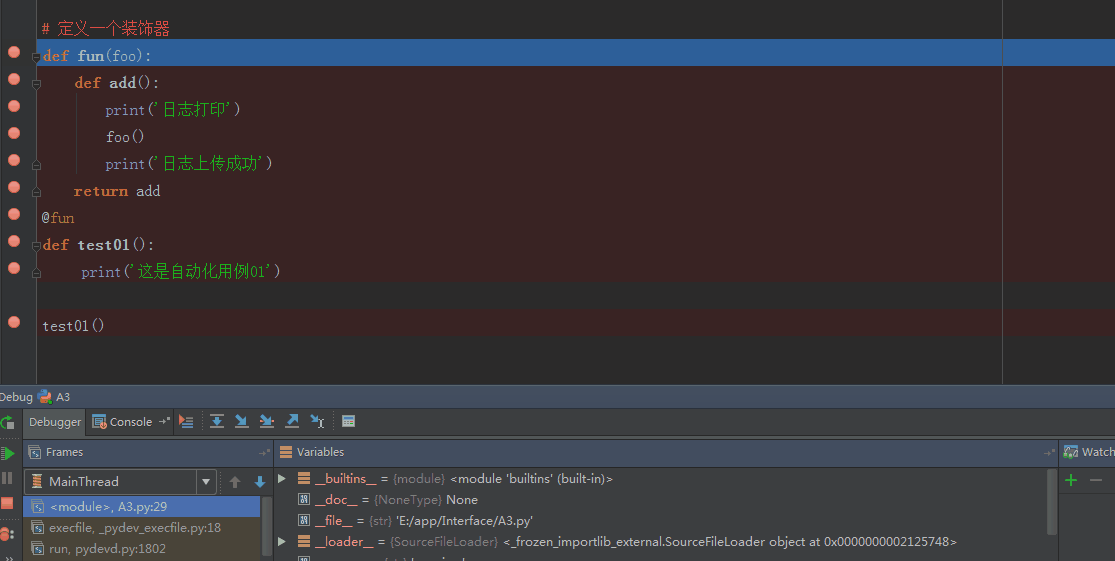Mentioned decorator, I think is an interview two years ago, the interviewer asked me, what decoration is? Can you write a decorator do? Then gone then ~
Decorator
Decorator: Decorative object device. Possible without modifying the existing code, or add new features to additional restrictions or the object to be decorated decoration objects help output device. Possible without modifying the existing code, add new features or additional restrictions to the object to be decorated or help output
Usage: enter directly on the object to be decorated @ decorator name
Before writing a decorator, let's write a function named test, and then let anjing = test, so go call anjing found on the implementation of the function test
DEF test (): Print ( ' which is the name of a function test ' ) anjing = test anjing () -------- ------ result which is a function named test
Here we write a function with parameters, then the above test function directly pass in
DEF test (): Print ( ' which is the name for the test functions ' ) DEF Anjing (A): # A = test Print (A) # test memory address A () # perform test Print ( ' which is the name for the anjing function ' ) anjing (test) ---------- results ------ <AT 0x000000000040C1E0 function test> this is the name of a function test which is a function name anjing
Here you will find that we do not change the function test, but the test is decorated with some of the content (anjing function)
To demand the leadership to say, write automated, each use case plus print log and log upload the word success.
Some people say that this is not simply each with both plus print ( 'log upload and print logs') can not it do? But with a few cases, we can, but if you use very many cases, we have each written by this method? It is not too much trouble, since seen the decorators, we might as well write a decorator.
# Define a decorator DEF Fun (foo): DEF the Add (): Print ( ' journal printing ' ) foo () Print ( ' log upload successful ' ) return the Add @fun DEF test01 (): Print ( ' This is the automation use cases 01 ' ) @fun DEF Test02 (): Print ( ' which is automation Example 02 ' ) Test01 () Test02 () ---------- ------- result log printing this embodiment is automation 01 log upload successfully log Print this is automation use cases 02 Log uploaded successfully
May have a little ignorant small partners, we look at how this process go through the debug mode, and then analyzed

analysis:
1, the program ran, encountered the first function fun time will function first stored in the memory space, and then continue down
2, continue to go down, met @fun decorator, then continue to take the contents inside decorator.
3, the implementation of operating rules decorators, the need to decorate the function name as a parameter passed to the function fun, decorative function performs its own internal code, will assign its return value to the function to be decorated.
Decorator with parameters
Will find the above use case test01 no arguments, arguments that if so, how should this decorator go? We write with a parameter of test01
# Define a decorator DEF Fun (foo): DEF the Add (username): Print ( ' log Print ' ) Result = foo (username) Print ( ' log successful upload ' ) return Result return the Add @fun DEF Test01 (name): Print ( ' % S running automation embodiment 01 ' % name) Test01 ( ' anjing ' )
-------- ------ results
Log Print
anjing run automation use cases 01
log upload success
This time certainly someone will ask, if you encounter some use cases pass a parameter, and some use cases passed two parameters, then how to get this time? It is actually very simple, ah, we are not in front of introduced non-fixed mass participation - * args, ** kwargs
# Define a decorator DEF Fun (foo): DEF the Add (* args, ** kwargs): Print ( ' journal printing ' ) the Result = foo (* args, ** kwargs) Print ( ' log upload successful ' ) return the Result return the Add @fun DEF test01 (name, Age): Print ( ' % S running automation use cases 01, and his age printed S% ' % (name, Age)) @fun DEF Test02 (name): Print ( ' % s to run the automation use cases 02' % Name,) Test01 ( ' anjing ' , 18 is ) Test02 ( ' ceshi ' )

In fact, everyone can write a decorator, but if you want to utilize in a scene decorator, this would require everyone to learn slowly, well, I was quiet, thank you for your attention